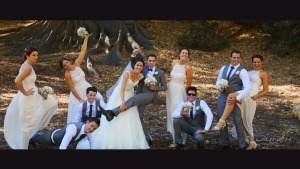11 Steps to Becoming a Wedding Videography Pro
 If you are passionate about live film production, wedding videography can offer you a steady stream of income. Creating wedding videos is an excellent way to profit from your equipment and experience. Wedding videography offers you the potential to build a lucrative business.
If you are passionate about live film production, wedding videography can offer you a steady stream of income. Creating wedding videos is an excellent way to profit from your equipment and experience. Wedding videography offers you the potential to build a lucrative business.
If you’re just entering the wedding videography industry, these 11 tips will help you produce professional wedding videos, from start to finish.
1. Run through a rehearsal.
Getting everything sorted in the wedding rehearsal is very important. The rehearsal helps you avoid problems with lighting, microphone placement, and blocked views. It also gives you another chance to consult with the bride and groom. Any last minute requests for their wedding video can be discussed before the wedding day rush is on.
2. Never forget: it is all about the bride and groom.
This is possible the most important tip of all. Keep in mind what the bride and groom want. Get as many shots of them as you can: holding hands at the rehearsal, when they first see each other at the ceremony, walking out together after the vows, the little looks they give each other at the reception, laughing, dancing and enjoying the spotlight. Get other people to talk about them on-camera. Concentrate on getting those once-in-a-lifetime shots.
3. Use gear that works in any light condition.
Weddings can be very challenging shooting environments, not only in terms of the event itself, but also in terms of lighting. So it’s a good idea to be prepared and have cameras and lenses that work well in low light conditions. Good gear helps, but in the end it’s about your approach: when you’re shooting a wedding video there’s always light, you just have to find it.
4. Keep the Camera Stable.
Stabilisation is necessary: going handheld is not going to cut it. Whether you use a tripod
monopod, glidecam, slider, or a shoulder rig, be sure that you can quickly switch between your support gear. By putting the same quick release plate on all of your gear, you can easily switch on the go.
Tripods are great during the ceremony, but can easily get in the way elsewhere. When you’re in a tiny hotel room with the entire bridal party, family members, hair stylists and makeup artists, you won’t have much space to work. Being able to quickly switch to a monopod or glidecam will keep you shooting.
5. Make sure you back up your audio.
Audio for wedding videos can be touchy. Remote microphones may pick up some voices better than others and last minute glitches could prevent you from getting any audio at all. This is why many wedding videographers are investing in audio recorders to back up their audio. They are also affordable enough that you can have several mics for various audio sources.
6. Work efficiently, light and fast.
It is better to be light with gear. Make it as easy as possible to switch lenses and stabilisation gear. I never shoot with a tripod at weddings but the monopod is perfect for getting a static shot and being able to quickly move from shot to shot, angle to angle. I keep the same base plate on the glide cam so I can easily switch back and forth when I need to.
7. Concentrate on close-ups.
It is extremely important to get close-up shots at the wedding. Close-ups make your images look sharper and they allow you to capture emotion in your wedding video. Be sure to get close-up shots of the bride and groom, the wedding party, and the parents throughout the wedding and the reception, and use them frequently.
8. Always capture the traditional wedding shots.
You may feel the need to experiment on the wedding day, but be sure to always get the typical wedding shots too. Experimenting is a great way to help you find your style, but don’t forget that couples want to see their vows, first dance, and cake cutting. Make sure you have the important things covered before you get all those cool transition shots.
9. Communicate with the couple and venue.
Well before the wedding date, you should have a sit-down meeting with the engaged couple. Get to know what they are looking for in their video. Do they want to make sure you capture certain moments? Will there be any surprises or choreographed dances you need to know about? Will the bride be wearing her Great-Great Grandmother’s earrings? Being ready to capture these moments will truly make your work stand out.
Reach out to the ceremony and reception venues and find out if they have any rules or regulations. Many churches won’t allow videographers in certain areas, so it’s important to note if you will need to bring a zoom lens. Some large reception venues require a proof of insurance before they let you shoot on the premises. It’s your responsibility to have everything in order before showing up.
10. Finish the job on time.
After you’ve shot the wedding ceremony and the reception, it’s time to produce the finished video. Make sure to allow at least a week of postproduction to finish the job on time. A week should give you time to transfer footage to your system, catch up with other possible clients, editing the ceremony, the reception, and the pre-and-post ceremonies, as well as transferring to tape or DVD and preparing the packaging.
Remember that the most important part of post-production is delivering the finished video on time. The married couple will be anxious to see their wedding video, and are depending on you to deliver it on the date and time that you promised. Your reputation, and your future clientele, depends on your ability to finish like a pro by producing a professional wedding video on time and on budget.
11. Remain focused on customer satisfaction.
A wedding videography business is not unlike any other business. From start to finish your customer service needs to be exemplary. It is important to be tactful at every stage. The wedding industry is a special field with its own unique quirks. Reputation is everything: you need to ensure you are on top of it all the way through





Leave a Reply